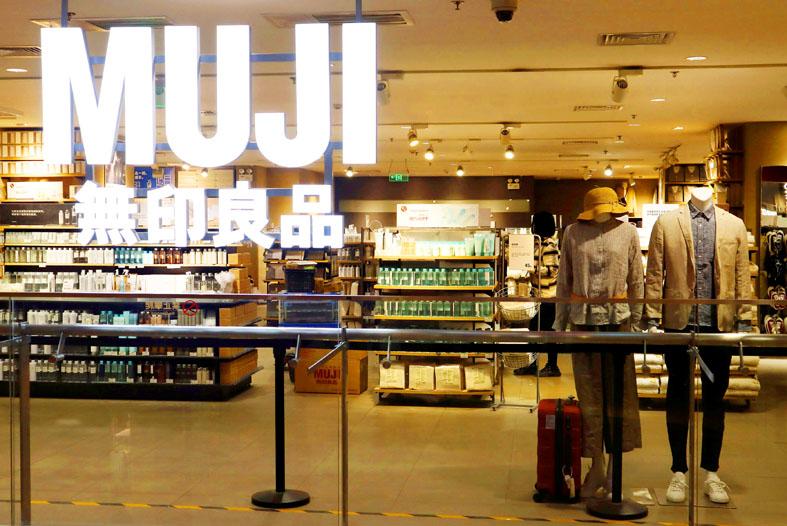Japanese brands Muji and Uniqlo yesterday became the latest to be embroiled in an escalating controversy over cotton sourced from China’s Xinjiang region.
Ryohin Keikaku Co, the operator of the Muji chain of minimalist furniture and lifestyle stores, saw its shares tumble after it issued a statement saying it was “deeply concerned” about reports of human rights abuses in the area, while several Chinese celebrities abruptly cut ties with Uniqlo, the clothing brand owned by Fast Retailing Co.
The firms join the likes of Hennes & Mauritz AB (H&M) and Nike Inc, which have seen their shares slammed after facing calls to boycott their products from Chinese users online due to their stance on forced labor in the region.

Photo: Reuters
Shares in Ryohin Keikaku, which advertises items using Xinjiang cotton, fell as much as 6.8 percent in Tokyo, the most since July last year. It said it had vetted its supply chain and would continue to monitor compliance with law.
The statement from Ryohin Keikaku “at this stage of the evolving saga puts the company in a similar position as H&M and Nike,” Bloomberg Intelligence analyst Catherine Lim said. “This may subject the company/Muji-brand to criticisms from Internet users in China and result in calls for boycotts.”
Ryohin Keikaku said it sourced cotton from many countries including China, but that it “thoroughly enforced compliance, so as not to be directly or indirectly involved in transactions prohibited by law.”
In the e-mailed statement, the firm said that an independent audit of plants in its supply chain in Xinjiang found that “there is no significant issue identified except for those issues that can be corrected by farms or ginning factories taking actions on their own to make immediate improvements.”
Kyodo News last month reported that the firm was one of 12 major Japanese companies that had decided to cease doing business with Chinese companies using forced labor in Xinjiang.
Shares in Uniqlo operator Fast Retailing also fell in morning trading before recovering. The company was cited among firms that had previously made remarks about Xinjiang cotton in a social media post by the Beijing Youth Daily Thursday.
The newspaper is the official paper of the Beijing Municipal Committee of the Communist Youth League of China, which has led the campaign this week against foreign clothing firms.
Several Chinese celebrities including actress Ni Ni (倪妮) and boy-band star Wang Yuan (王源) announced the same day they were severing ties with the Uniqlo brand.
While Muji has not yet been actively targeted by Chinese consumers, investors are selling on concern that such a movement might grow, said Shoichi Arisawa, an analyst at Iwai Cosmo Securities Co.
He also expressed concern that Ryohin Keikaku’s position on Xinjiang cotton could lead to an impact outside of China.
“If a movement spreads worldwide against products using raw materials produced by Uighur forced labor, concern will increase,” he said.

AI BOOST: Although Taiwan’s reliance on Chinese rare earth elements is limited, it could face indirect impacts from supply issues and price volatility, an economist said DBS Bank Ltd (星展銀行) has sharply raised its forecast for Taiwan’s economic growth this year to 5.6 percent, citing stronger-than-expected exports and investment linked to artificial intelligence (AI), as it said that the current momentum could peak soon. The acceleration of the global AI race has fueled a surge in Taiwan’s AI-related capital spending and exports of information and communications technology (ICT) products, which have been key drivers of growth this year. “We have revised our GDP forecast for Taiwan upward to 5.6 percent from 4 percent, an upgrade that mainly reflects stronger-than-expected AI-related exports and investment in the third

Mercuries Life Insurance Co (三商美邦人壽) shares surged to a seven-month high this week after local media reported that E.Sun Financial Holding Co (玉山金控) had outbid CTBC Financial Holding Co (中信金控) in the financially strained insurer’s ongoing sale process. Shares of the mid-sized life insurer climbed 5.8 percent this week to NT$6.72, extending a nearly 18 percent rally over the past month, as investors bet on the likelihood of an impending takeover. The final round of bidding closed on Thursday, marking a critical step in the 32-year-old insurer’s search for a buyer after years of struggling to meet capital adequacy requirements. Local media reports

TECHNOLOGICAL RIVALRY: The artificial intelligence chip competition among multiple players would likely intensify over the next two years, a Quanta official said Quanta Computer Inc (廣達), which makes servers and laptops on a contract basis, yesterday said its shipments of artificial intelligence (AI) servers powered by Nvidia Corp’s GB300 chips have increased steadily since last month, should surpass those of the GB200 models this quarter. The production of GB300 servers has gone much more smoothly than that of the GB200, with shipments projected to increase sharply next month, Quanta executive vice president Mike Yang (楊麒令) said on the sidelines of a technology forum in Taipei. While orders for GB200 servers gradually decrease, the production transition between the two server models has been

ASE Technology Holding Co (日月光投控), the world’s largest integrated circuit (IC) packaging and testing supplier, yesterday announced a strategic collaboration with Analog Devices Inc (ADI), coupled with the signing of a binding memorandum of understanding. Under the agreement, ASE intends to purchase 100 percent shares of Analog Devices Sdn Bhd and acquire its manufacturing facility in Penang, Malaysia, a press release showed. The ADI Penang facility is located in the prime industrial hub of Bayan Lepas, with an area of over 680,000 square feet, it said. In addition, the two sides intend to enter into a long-term supply agreement for ASE to